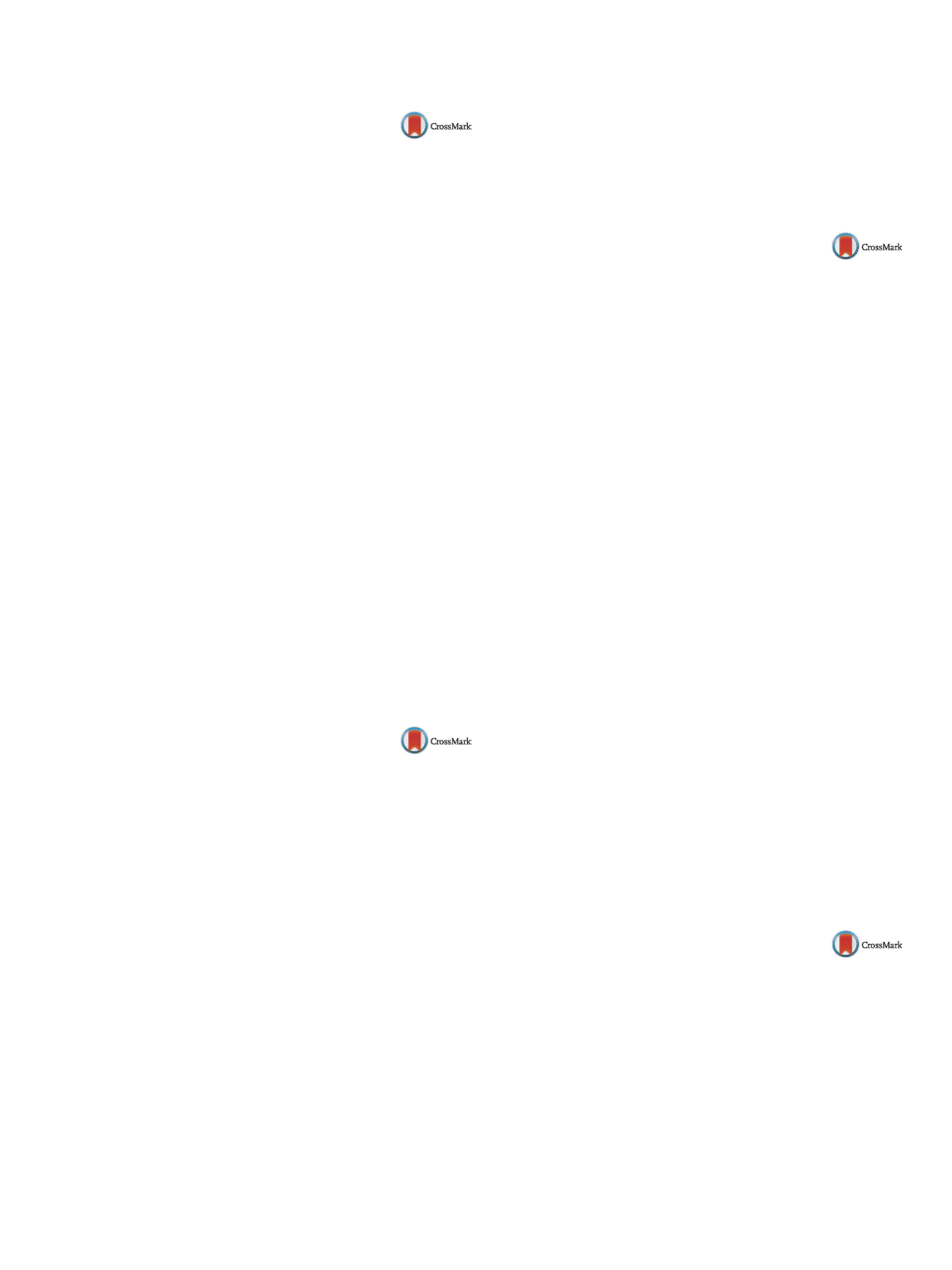

25th European Congress of Psychiatry / European Psychiatry 41S (2017) S521–S582
S543
EV0426
Memory, attention and language
deficits in major depressive disorder
B. Suciu
1 ,∗
, R. Paunescu
2, I. Miclutia
21
Children’ s Emergency Hospital- Cluj-Napoca, Romania, Psychiatry
Clinic- Cluj-Napoca, Romania, Cluj-Napoca, Romania
2
Iuliu Hat¸ieganu University of Medicine and Pharmacy, Department
of Neurosciences, Cluj-Napoca, Romania
∗
Corresponding author.
Objectives
For a long time, cognitive deficits were considered
as part of depressive episodes and were expected to improve as
other affective symptoms diminished with treatment. Because of
this, cognitive impairmentwas rarely assessed forMajor depressive
disorder, but in the present time this has changed.
Methods
The study included 35 patients (age between 18 and
70) diagnosed with recurrent major depressive disorder (accord-
ing to ICD-10 and DSM-V) which were evaluated during an acute
depressive episode. The severity of depression was quantified clin-
ically and with the help of Hamilton Depression Rating Scale -17
items- whereas cognitive functions were evaluated with standard
cognitive tests.
Results
Out of the 35 patients included, 25 were female patients,
the rest of 10 being represented by male participants. A median
score of 81,5 seconds on the Trail Making Test part A showed atten-
tion focusing deficits when compared with standard scores. For
semantic fluency, ten words represented the mean score; whereas
for phonemic fluency the mean score was lower (seven words). A
median score of 5 words resulted from the assessment of the verbal
learning and memory, these are considered to be associated with
memorization and retention of a list of words given.
Conclusions
These results sustain what the majority of studies
revealed, that cognitive deficits are present in all cognitive domains,
mostly in attention, verbal fluency and memory.
Disclosure of interest
The authors have not supplied their decla-
ration of competing interest.
http://dx.doi.org/10.1016/j.eurpsy.2017.01.756EV0427
Pathologies related to depression in
elderly patients
J. Batistella
1, G. Hida
2, D. Malheiros
2, G. Taniguchi Rodrigues
3,
F.J. Ropero Peláez
4, J. Magalhães
1, S. Taniguchi
1 ,∗
1
Albert Einstein Hospital, Basic Sciences, São Paulo, Brazil
2
Albert Einstein Hospital, Health Economics, São Paulo, Brazil
3
Centro Universitário do Estado do Pará, Faculty of Medicine, Belém,
Brazil
4
UFABC, Mathematics Computation and Cognition, Santo adré, Brazil
∗
Corresponding author.
Introduction
The occurrence of chronic diseases, motor limita-
tion, cognitive impairment and social isolation could be related to
late life depression.
Objective
To describe the pathologies related to elderly patients
with depression. To study possible relationship between depres-
sion and others pathologies in elderly patients.
Methods
This retrospective study included 124 geriatric patients
enrolled in a private long-term care institution with mean age
of 86.2
±
6.5 years old, mean weight of 60.28
±
2.00 kg and mean
period of hospitalisation of 4.4
±
2.3 years. For data analysis,
double-entry tables and tests of proportion Qui-square were used.
Results
Cardiovascular, respiratory, endocrine metabolic, skele-
tal muscle, sense organs, hematological, digestive tract; neuropsy-
chological and genitourinary, diseases were analyzed.
We observed a significant correlation between depression and
endocrine-metabolic (
P
value of 0.0003), sense organs (
P
value of
9.298 E-5) and skeletal muscle pathologies (
P
value of 6.843 E-6)
Conclusions
We observed in that population that depression
could be prevalent in elderly patients with endocrine-metabolic,
sense organs and skeletal muscle pathologies.
Disclosure of interest
The authors have not supplied their decla-
ration of competing interest.
http://dx.doi.org/10.1016/j.eurpsy.2017.01.757EV0428
Effect of yoga and meditation on
accelerated cellular aging in major
depressive disorder patients
T. Madhuri
1 ,∗
, R . Dada
1 , R.Sagar
21
All India Institute of Medical Science, Anatomy, Delhi, India
2
All India Institute of Medical Science, Psychiatry, Delhi, India
∗
Corresponding author.
Introduction
Accelerated aging is associated with major depres-
sive disorder (MDD) and studies of yoga and meditation based
lifestyle intervention (YMLI) on biomarkers of cellular aging are
lacking.
Aim and objectives
To investigate the peripheral blood biomark-
ers of cellular aging in MDD patients after short term YMLI.
Biomarkers include DNA damage, oxidative stress (OS), telomere
attrition, and nutrition sensing assessed respectively by 8-hydroxy
2’- deoxyguanosine (8-OHdG); reactive oxygen species (ROS) and
total antioxidant capacity (TAC); telomere length and telomerase
activity; and sirtuin-1.
Methods
We consecutively enrolled 33 MDD patients and 40
healthy subjects; 30 MDD patients were followed up with 12-
week YMLI. Biomarkers of cellular aging in peripheral blood
were measured with assay kits. All patients were evaluated by
examining the correlation between cellular aging markers and
Montgomery–Asberg Depression Rating Scale (MADRS) scores.
Results
The levels of DNA damage, OS, and telomere attrition in
MDD patients were significantly higher than healthy subjects (all
P
= 0.005). The MADRS scores had a significantly positive associ-
ation with 8-OHdG and ROS levels and negative association with
TAC, telomerase and sirtuin-1 levels (all
P
< 0.01).
Conclusions
Peripheral blood biomarker levels in our results sug-
gest significant cellular aging inMDD patients compared to healthy
subjects. There was strong correlation between the changes in
biomarkers of cellular aging and clinical improvement in MDD.
Our study is the first to show significant increase in sirtuin-1 levels
in MDD patients after yoga and meditation. Therefore, biomarkers
of cellular aging might be indicators of MDD severity and clinical
remission after YMLI.
Disclosure of interest
The authors have not supplied their decla-
ration of competing interest.
http://dx.doi.org/10.1016/j.eurpsy.2017.01.758EV0429
Depression screening in primary care
patients
J. Ben Thabet , M. Turki , M. Mezghanni , M. Maalej Bouali ,
N. Charfi
∗
, S. Omri , N. Zouari , L. Zouari , M. Maalej
Hedi Chaker University Hospital, psychiatry “C” department, Sfax,
Tunisia
∗
Corresponding author.
Introduction
Depression is a commonmental disorder that can be
associated with more functional disability than most chronic med-
ical illnesses and the increased reporting of medically unexplained
somatic symptoms.
Aim
To assess the prevalence of depression in a Tunisian popu-
lation, as well as the associated factors.
Methods
We conducted a cross-sectional, descriptive and ana-
lytic study, among 707 subjects consulting in 20 primary care


















